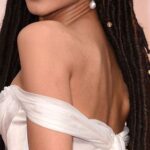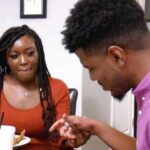
Source: Judith Floresca / Courtesy of Danni Washington
What exactly is a science communicator?
According to Danni Washington, it’s an individual who uses different platforms to publicly educate and raise awareness on important science-related topics and issues. She would know well about this because Washington is a really good one. In addition to being a Black woman marine biologist (which we love to see), she’s also the host of a new podcast called The Genius Generation on the science site Seeker where she highlights the work of young inventors.
Her work has been a passion since she first found a love for marine life as a child.
“I grew up in Miami and with a family that was willing to go the beach a lot. That was our favorite recreational activity,” she tells MadameNoire. “And so the curiosity and the love for the ocean began when I was just a toddler. It’s been a life-long passion.”
Her interests in the marine sciences were nurtured by her parents. They bought her all the books they could find, and supported her when she started doing research work back in high school, starting early. She would go on to get a bachelor’s in science at the University of Miami as a double major in marine science and biology. After college, she stopped focusing on research and got more into taking her work to the people.
“I took a turn after undergrad to move into science communication. I saw there was a major missing link in the community where people didn’t quite understand the importance of the ocean and marine ecosystems and how it directly impacted our lives,” she says.
She felt “the sense of urgency” to bridge the academic aspect of things with the general public and do it in a way that was fun. So she’s been in science media, producing video content and digital content explaining science in a digestible way ever since, which has been for the last 12 years. She’s made educational videos for textbooks by Pierson Publishing and from there learned how to film, write scripts, and edit video. Afterward, she began hosting the STEM series Xploration Nature Knows Best, making her the first Black woman to host a science show in the US. She was most recently on CBS’ Mission Unstoppable, which features women in STEM. Her latest work is The Genius Generation, which launched on March 18, and it’s a series she’s immensely proud of. It speaks not only to pre-teens of today but also to the tween that was once in all of us.

Source: Judith Floresca / DANNI WASHINGTON
“We all go through that weird phase as a tween, and I just love that this podcast is speaking directly to them. I know if I had access to podcasts like this when I was a tween, it would have made a world of difference because it would have showed me what was possible at my age,” she says of the podcast and its guest list of impressive young scientists. “They’re lightyears ahead of what most people would expect them to be talking about: machine learning, creating their own apps and doing all these amazing things with all the technology they have access to, but using it for good.”
She’s learned a lot from the young people featured and believes the podcast will be a “beautiful source of inspiration for lots and lots of young people around the world.”
From her own experience as a young Black girl who didn’t get to see many Black marine biologists growing up, she hopes her visibility, and the visibility of young people who love science and have created remarkable things, will encourage more young girls and women to be drawn to STEM fields.
“My hope is simply to encourage them to believe that they can do whatever they set their minds to. You have to see it to be it and it required me as a young child to use a lot of imagination, which is a good thing, and to envision myself in the place that I am today,” she says. “Now it’s more important than ever because the STEM field, in particular, these disciplines of science, technology, engineering and math, are really the disciplines that are going to help create the solutions we need for the future as we tackle COVID-19, the climate crisis, social injustice. There’s so many different levels to this.”
She adds, “If we get more folks involved in STEM, we’re going to get to those solutions a lot quicker.”
Aside from her podcast and other modes of science communication, one way she’s hoping to get more young people involved is through her non-profit organization The Big Blue & You, which was created in 2008. Inspired by kids in Miami, it helps children have access to the beach and “connect with the ocean in a really interesting way.”
The ocean is clearly very important to Washington, and she believes we should all care more about it and environmental issues as a whole, whether we want to study them or not, because they can and will affect us.
“It’s the great equalizer. The ocean covers three-fourths of our planet and provides every second breath that we take in, the oxygen that we breath. Provides protein, food for billions of people around the world, and also it’s the biggest proponent of maintaining our climate. That’s the big picture thing. But beyond that, we need healthy oceans to live, period,” she says.
“It’s full circle. Whatever happens in nature is going to happen to us, and the planet will go on with or without us,” she adds. “It’s just about us deciding our behaviors, our day-to-day actions, how that’s impacting the people around us and the environment around us.”


